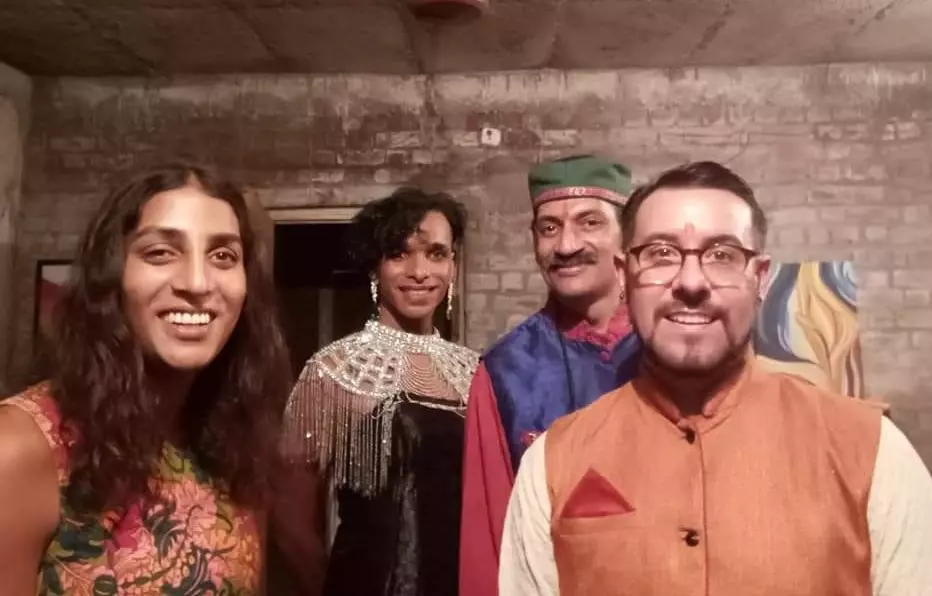
Queer Bagh: A home away from home in Gujarat for LGBTQA people
Queer Bagh, brainchild of a descendant of Rajpipla royal family and his American husband, offers queer people food and shelter and even counsels their families

Some 200 km from Ahmedabad, in the erstwhile princely state of Rajpipla, stands a unique sanctuary for the people of LGBTQA community. Named Queer Bagh, the shelter is run out of an old property on the banks of the Narmada that Manvendrasinh Gohil, a descendant of the royal family, inherited from his grandfather. Gohil himself came out as gay in 2006, only to be promptly disowned by his family.
“The idea was to build a home away from home for LGBTQA people in distress — young, vulnerable people who are confused or have run away from home or have been thrown out of their homes for their sexuality,” Gohil told The Federal.
Queer Bagh was the brainchild of Gohil’s American husband DeAndre Richardson. It was inspired by an American LGBTQ community centre. At first, Queer Bagh was meant to be just a retirement home for transpeople and started off as a 10-bed dormitory. Later, the idea to turn it into a fully-fledged community centre for queer people took shape.
A home away from home
The old palace in central Gujarat’s Narmada district started being shaped into a community shelter in 2018. The 15-acre property will house lodging quarters, a library, a dedicated area for organic farming, and a community kitchen.
The library, which was built with a donation from Surendra Barot, an 85-year-old NRI based in California, is currently getting its final touches. Barot has dedicated it to the memory of his late son, Hitesh. The library has already been adorned with books sent by Gohil’s LGBTQA friends from Mumbai.
The shelter, which has primarily run on donations so far, allows residents to stay on for as long as they want, free of cost. However, they have to go through a screening committee, which gets the background of every applicant cross-checked through the Integrated Network for Sexual Minorities (INFOSEM) before confirming their stay.
“There is no charge for the stay, as the campus runs entirely on donations. The only thing we compulsorily ask of our residents is to volunteer to help maintain the property. That includes cooking, cleaning, and maintenance work around the compound,” said Riya Patel, the manager of Queer Bagh who is an NRI transwoman.
The shelter is run out of an old property Gohil inherited from his grandfather
Food, shelter, and help
Patel had contacted Gohil in 2017 for help and ended up becoming an essential part of the shelter. The second member to join Queer Bagh was Shailesh Raval, a 40-year-old gay man from a neighbouring village. Raval, who never had the courage to come out to his family, still lives in the shelter. He is the “go-to man” for anything and everything on the campus.
“I first contacted him (Gohil) when he was looking for someone to care for his ailing grandmother. I never went back home. This is where I can live without hiding my identity,” recalled Raval.
“LGBTQA people are rarely accepted by their families. This is a major issue in India, and at Queer Bagh, we plan to help these vulnerable people by providing them with shelter, counselling, and vocational training before sending them back to the world,” said Patel.
Queer Bagh’s first resident was Tanay Banerjee from Kolkata. He wrote to Gohil seeking help and has stayed on at the shelter. He handles the responsibility of running the kitchen and taking care of Gohil’s six dogs.
Gohil with a member of the LGBTQA community
The gay prince of Rajpipla
But that is not all. Gohil and his team also counsel the family members of those who come to them for help in a bid to have them accepted. “We have also counselled the parents and grandparents of many members who have stayed with us for a short time. We have helped them accept their children as they are,” said Gohil, who himself has gone through a harrowing journey because of his sexuality.
“I was disowned by my family, so I know how it feels. It can happen to anyone. It takes time to heal and regain your confidence,” he added.
In 1991, at the age of 25, Gohil was forced into an arranged marriage with Princess Chandrika Kumari of Jhabua, Madhya Pradesh. However, the couple was granted a swift divorce in 1992 on the grounds that the marriage had never been consummated.
The divorce and its circumstances, however, did not go down well with Gohil’s parents. Subsequently, he was subjected to all kinds of “treatment”, including both medical and religious. His parents took him to various doctors to find out what was “wrong” with him. And in 2002, Gohil was even hospitalized for “mental health issues”. He was released after he spoke to his psychiatrist about his sexuality.
“After that, my parents sent me to various religious leaders to shake the gayness out of me. One of them even suggested vegetarian food for me, after which I was put on a vegetarian diet for years,” narrated Gohil.
Broken bonds
Finally, in 2006, he openly came out as gay, after which his mother publicly disowned him through a newspaper advertisement. He even received threats from his family, as well as outsiders.
Three years later, he met American citizen DeAndre Richardson on an online dating platform, and they tied the knot in 2013 in Seattle. Since then, Gohil and Richardson have been vocal activists for LGBTQA rights and have made several appearances on television shows, including The Oprah Winfrey Show.
Over the years, his father’s attitude has softened a bit, said Gohil, but his mother never came around to accept his sexuality. “If we ever cross paths, we ignore each other,” he shrugged. “But my father even attended the inauguration of Queer Bagh. We have a good relationship now,” he smiled.
